5 Major Mistakes Baseball Players Make In-Season
With baseball season officially upon us, I wanted to break down the 5 mistakes I commonly see baseball players make in season and how you can avoid them. Baseball players often stop working out, and they have poor sleep and nutrition habits. These problems are compounded by poor time management skills. Here are some easy solutions on how to manage your time wisely to maximize your season!
If you are not a subscriber to Esposito Strength Club, make sure you click here to subscribe so you don’t miss out! You will also get access to all of my Free Online Baseball Courses!
1. You Stop Working Out
Look, I get it. I was a player and I remember the hectic schedule of school, practice after school, games, travel, lessons…but like a said above, it’s a SCHEDULE. I don’t know of many NCAA or Pro level teams not lifting in season. Making it a point to find 2-3 hours per week to take care of your body is not that much to ask.
Let’s put that in perspective. In a recent survey of time spent playing Fortnite during the week, 29.4% said they played Fortnite 0-5 hours per week while 32.5% played for 6-10 hours per week.
Now, I’m not saying to not play video games because, like many, I like to merk some noobs playing Battlefield 1 on the PS4 from time to time, but I don’t let it impact my training or my job.
What are Your Priorities?
Baseball in-season strength training is important for staying healthy and maximizing performance. Remember, some of you have spent months of training to get into the best shape you could be leading to this season. Your off-season was designed to maximize your on-field performance.
That can also be said about your in-season program, not only can you still increase your strength, but you are also maintaining your movement quality. This will have a large impact on your durability throughout the season!
If you stop training altogether, you run the risk of breaking down sooner, especially with an often hectic and busy baseball schedule. For some of you, you will go from 1-2 hours a week of baseball to potentially 15-20 hours!
Other in-season benefits will vary from player to player but include maintaining strength, managing stress placed on tissues during the season, and working to continue your athletic development.
If you are not sure what to do for in-season strength training, make sure you check out the program Mike Reinold and I put together: Champion In-Season Baseball Performance Program.
Baseball In-Season Strength and Conditioning Guidelines
I recently put together an In-Season Baseball Strength Training Series. I breakdown common myths, misconceptions, schedules and more! Make sure you check those out below.
In-Season Lifting Part 1: General Guidelines
In-Season Lifting Part 2: Youth Baseball
In Season Lifting Part 3: High School Baseball
2. You Don’t Get Enough Sleep
Sleep is by far one of the most common areas that teenagers neglect. I’ve been there myself. On school nights, I used to stay up past midnight watching TV, playing video games (being on your cell phone wasn’t a thing yet in 2000-2004 when I was in high school). I’d wake up at 5:45 am and repeat for the week. Then on the weekends, I’d sleep till 1-2 in the afternoon. I was a SLUG! My grades suffered, and my body recovery was terrible.
Why Does Sleep Matter?
Sleep is one of the body’s most important biological functions with roles in performance, cognition, learning, development and mental and physical health.
While there are numerous consequences as a result of inadequate sleep, identifying sleep problems and following the recommended sleep guidelines can help ensure sporting performance is maximized.
From an academic perspective (don’t forget, STUDENT-athlete), we know having adequate amounts of sleep will increase your performance in the classroom. Not only can your test scores increase, but your cognitive function, thinking, and creativity can see improvements as well.
Now, put yourself in the mind of a college coach and recruiter…the more colleges you qualify for academically, the more you can consider athletically!
Sports Performance Benefits
From an athletic perspective, having an adequate amount of sleep has tremendous improvements to your performance.
“Sleep is the most potent performance enhancing activity that we know of.”
– Jeffrey Kahn, Sports Performance Scientist.
In a recent study, student-athletes who get less than 8 hours of sleep per night are 70% more likely to get injured. If you are getting less than 6 hours of sleep, you are reducing your reaction time by 18%.
Baseball is a reaction sport. Hitters are reacting to the pitcher. Fielders are reacting to the hitter. Baserunners are reacting to every pitch and play of the game! 18% is A LOT to lose.
Again, sleep is an obstacle that all athletes have to face. When you get optimal sleep duration (8-10 hours), one night of sleep improves motor learning task speed by 20% and accuracy by 39%. Baseball players improve reaction times by 122 milliseconds. To put that in perspective, a 90-mph fastball takes about 400 milliseconds to travel from the pitcher’s hand to home plate. Improved sleep can also decrease fatigue by 40%. I guess you could say sleep is important.
How to Help Your Sleep
- Turn off the TV
- Limit blue light use (phones, tablets, laptops, computers) 2-3 hours before bedtime.
- Read a book
- Watch caffeine intake during the afternoon
- Get consistent with your sleep and wake-up schedule
- Put items that can be a distraction in a different room
3. Your Nutrition Is Lacking
The nutrition and food choices you make every day will have a tremendous impact on your energy levels, baseball performance, and your overall health!
Without proper nutrition, you can become lethargic, you can lose the ability to concentrate, and you are missing out on your body’s ability to recover. All of these will have an impact on your academic and sports performance.
You need to remember; your food is your fuel. The quality and quantity of your nutrition matter a whole lot, especially in sports performance.
I really want to make sure you realize that this is not a “diet.” Diets are often restricting, limiting, and often difficult for athletes, especially NCAA, high school and youth athletes to follow. What we want is an abundance of good quality, highly nutritious foods.
A mistake many make is looking for a quick fix or a quick solution to what needs a long-term commitment. Sure, adding in nutrients you may be lacking and cutting out junk food will help short term, but you need to remember sports performance is year round.
Drink More Water!
Drinking water is something many athletes lack. Water can help maximize your body’s natural functions, as well as help you maintain your energy levels and brain function. Your body is constantly losing water throughout the day, then you go to play games and practice in hot weather.
While sports drinks do have some positives such as electrolytes and good carbs, you are also taking in large amounts of sugar.
Taking Control of Your Nutrition
I recommend you track your food and nutrition daily. This will give you a good idea of your eating habits, intake, and nutrient timing. You can use apps on your phone or computer, or the old-fashioned journal works just as well.
Another helpful tip is meal prepping and planning. Planning out your food will allow you to create and stick to a schedule. This will help you make better choices throughout the day. If you are not shopping for yourself, talk with your parents and help out with the grocery list.
Finding a nutrition plan can be hard as it should be unique to the individual. Everyone has different needs based on activity levels, goals, schedules, and personal lifestyles. I would recommend you see a nutritionist for more on that!
4. Time and Schedule Management
We touched on this above regarding strength training and finding time to lift. When it comes to time management, everyone can always do a better job. The number 1 excuse I hear from athletes, especially in-season, is they don’t have enough time. I call BS.
Athlete schedules can be all over the place in today’s sports world. There is really no way around that as that has become the norm for playing sports. What changes though are your priorities and your choices. These choices and priorities will impact your sleep, nutrition, and development.
What’s Out of Your Control
To begin to work on your time management, you must make a list of necessities or items that just simply won’t change or go away. For example, we know your school schedule really won’t change all that much. From roughly 7:30 till 2:30, you are unavailable.
Once the weather cooperates, typically your baseball games and practices are usually right after school. On average, you can be done by 5 pm. If you don’t get in bed until 10 pm, what are you doing with those 5 hours a day… which equals 25 hours from Monday-Friday?
Well, you have to eat, and family time is huge, don’t forget that. We also know you will have homework. Obviously, that will depend on your school, grade, and course load but that could take up 2-3 hours a day right there.
So that leaves you with potentially 2 hours a day or 10 hours during the weekdays. Those 10 hours can be spent on self-development, strength training, sport skill development, hanging out with friends or personal time.
How to Work on Your Time Management
I would highly suggest you make a daily schedule or journal for yourself to see where your free hours are and how you can maximize your time. Keeping a schedule will allow you to take control of your daily routine, start controlling external factors a bit better, and manage some potential stressors.
5. You Ignore Recovery
When we put the previous 5 mistakes together, that adds up to a lack of recovery and potentially impacts your baseball performance. Baseball is a very violent sport from a biomechanical standpoint. The demands and forces placed on your body are some of the highest in sports. Taking care of your body is like charging your batteries.
I recently heard a very good analogy from Cory Schlesinger, a strength coach at Stanford University. Cory discussed an analogy he got from Jordan Shallow and compared the athlete’s injury risks with outside factors.
“Jordan Shallow gave me this metaphor, he was saying this fungus will fill up a pond and it doubles its size every day. So, if it starts off at .2, then the next day is .4, he asked me, if it’s going to fill up a whole pond in 30 days, what’s the day it’s half full. Day 29. That’s how I look at the human body. It’s literally the last thing and then boom. We could’ve had all these interventions from Day 2 to Day 28 or Day 29 even, but it’s that one last straw that breaks the camel’s back.”
What does that mean?
There are many factors that go into your athletic development. As athletes, being able to manage your stress, school, sleep, nutrition, time management will lead to an optimized sports performance environment for you to thrive in. All those factors mesh and work together.
For example, many coaches will look for the exact moment of a sore arm, or injury from sport, but will forget to look at all the other factors that could’ve led to that injury. While being injured is not ideal, getting healthy and making sure it doesn’t happen again is key.
Final Thoughts
One big takeaway I hope you got from this post is that all of these mistakes can be 100% controlled by you. Your body’s recovery can be impacted by being proactive with your time and schedule management. This will allow you to maximize workout schedule and outside factors and stressors. Your nutrition and sleep will have an impact on your performance on and off the field as well as in and out of the classroom.
All of the mistakes work cohesively together. It’s up to you whether they work for you or against you.
Nick Esposito
Latest posts by Nick Esposito (see all)
- 5 Sprint Drills Designed for Baseball Players - October 8, 2019
- Nutrition for Baseball Performance - September 10, 2019
- The 3 Foundations to Your Nutrition: Macronutrients - August 13, 2019

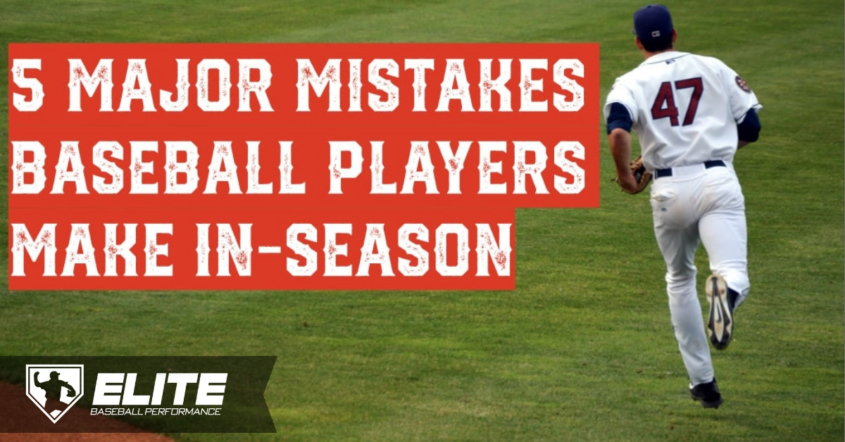




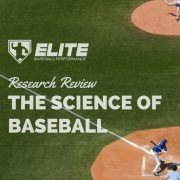
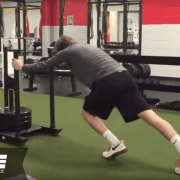
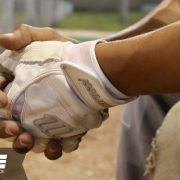
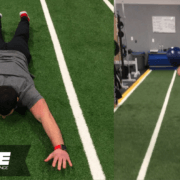
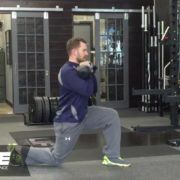


Es sind maximal 41 von 51 Trophäen erspielbar.